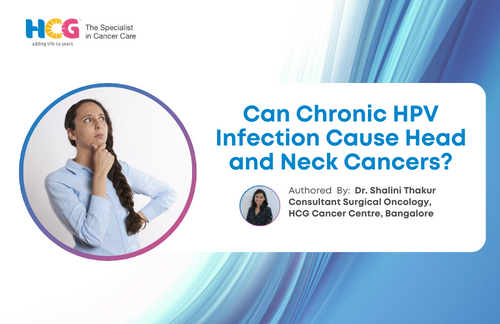
16 Jan, 2025

16 Jan, 2025

This article is medically reviewed by Dr. Shalini Thakur, Programme Director - Oral Onco Surgery and Rehabilitation, HCG Cancer Centre, Bengaluru
Several patients ask, “Can HPV cause head and neck cancer?” While it is widely recognized that smoking is a significant cause of head and neck cancers, it is less commonly known that prolonged exposure to the human papillomavirus (HPV) can also lead to head and neck cancers as well.
Research suggests that approximately 30% of oropharyngeal cancers, which occur in the tonsils and base of the tongue, are attributable to HPV infections.
This may be an alarming number; however, there are ways to diagnose and manage these cancers accurately and successfully. A few measures can also help reduce your risk.
Before learning how to prevent them, it is important to understand what an HPV infection is and how it is linked to head and neck cancers.
Human papillomavirus (HPV) is a common sexually transmitted infection that affects both men and women. In most cases, HPV infections clear up on their own.
However, in some cases, they can become chronic and become responsible for the development of various types of cancer, such as cervical cancer, vulvar cancer, vaginal cancer, penile cancer, anal cancer, and head and neck cancer.
Head and neck cancer associated with HPV infection is more likely to occur in the oropharynx, which comprises the back of the throat, the base of the tongue, and the tonsils.
When HPV infects the cells in the head and neck region, it alters the DNA structure of the infected cells and makes them divide uncontrollably. This abnormal division of cells leads to the formation of cancer.
This virus can also evade the immune system, allowing it to remain in the cells and continue to damage the cells in that region.
Of the many strains of HPV, HPV 16 is strongly associated with cancer risk; about 90% of HPV-induced head and neck cancers are caused by this strain.
HPV-positive oropharyngeal cancers caused by HPV-16 have different characteristics compared to oropharyngeal cancers that HPV does not cause.
These differences include how common they are (epidemiology), how they appear and affect the body (clinical presentation and anatomy), how they show up on medical scans (radiology), how they behave (behavior), how they grow and spread (biology), and their expected outcome (prognosis).
Oropharyngeal cancer is the most common type of head and neck cancer associated with HPV infection.
HPV infection can also cause oral cancer, where the cancer formation occurs in the lips, tongue, gums, and lining of the cheeks.
In some cases, HPV infection causes cells in the nasopharynx (the area behind the nose and top portion of the throat) to divide abnormally and form cancer.
HPV infections can also lead to hypopharyngeal (where the throat meets the esophagus) cancers.
Some of the head and neck cancer HPV symptoms are:
One of the most significant risk factors for head and neck cancer is chronic HPV infection. It is a common risk factor for oropharyngeal cancer.
HPV, especially HPV-16, results in cellular changes in the linings of the tonsils, throat, and tongue base, leading to cancer in the long term. The risk of head and neck cancer due to HPV infection is reduced through vaccination and early diagnosis.
HPV causes head and neck cancer. Oral and sexual behaviors, such as engaging in oral sex, having multiple sexual partners, and practicing unprotected sex, increase the risk of HPV infection.
HPV is generally transmitted with unhygienic oral and sexual behaviors, and certain strains of HPV, such as HPV-16, have a strong correlation with oropharyngeal cancer.
HPV vaccination and practicing safe sex assist in reducing the risk of HPV-associated oropharyngeal cancer.
“Can HPV cause cancer?” This is one common question that those diagnosed with HPV infection often have.
Although there are no known ways to prevent the risk of HPV-induced head and neck cancers completely, some measures can help reduce their risk significantly. They include:
As responsible surgical oncologists, it is our goal to not only treat HPV-related cancers but also to promote measures that prevent their occurrence.
HPV vaccination has proven to be highly effective in preventing most cases of such cancers, and therefore, we should actively advocate for its adoption.
HPV vaccines can help in preventing chronic HPV infections and thereby reduce the risk of different types of cancer, including head and neck cancer, among men and women.
The Centers for Disease Control and Prevention recommend that all children receive the HPV vaccine at age 11 or 12. The vaccine is also recommended for unvaccinated males through age 21 and females through age 26.
HPV spreads through sexual contact; therefore, one way to reduce chronic HPV infection is by practicing safe sex habits, which include using appropriate protective measures and avoiding multiple sexual partners.
Regular cancer screening can help detect head and neck cancers early when most treatable. The screening test involves a complete examination of the oral cavity and the head and neck region for signs of cancer.
Tobacco use and excessive alcohol consumption can affect how the immune system functions and indirectly contribute to the increased risk of HPV-induced head and neck cancers. Therefore, avoiding tobacco and excessive alcohol can be helpful.
Good oral hygiene can help prevent HPV infection and reduce your risk of head and neck cancers.
HPV is a common sexually transmitted infection that increases the risk of several cancers, such as head and neck cancers. HPV-16 is one strain of HPV that is predominantly associated with oropharyngeal cancer.
Risk factors for chronic HPV infection include oral and sexual behaviors. The risk of HPV infection may be reduced through vaccination, regular screening, maintaining good oral hygiene, practicing safe sex, and avoiding tobacco and excessive alcohol consumption.

Dr. Shalini Thakur
Programme Director - Oral Onco Surgery and Rehabilitation
MDS (Oral/Maxillofacial Surgery), Fellowship in Oral Oncosurgery
Dr. Shalini Thakur is an experienced and dedicated oncologist with over 15 years of experience in oral oncosurgery and rehabilitation. She is available for consultation at HCG Cancer Centre, KR Road, a leading oncology hospital in Bangalore. She is highly knowledgeable in her field and is passionate about providing her patients with the best care possible. With her clinical expertise, she is highly skilled in providing comprehensive and compassionate care to her patients. She is also actively involved in research projects to further improve the understanding of head and neck cancer and to help those affected by it.
To book an appointment with Dr. Shalini Thakur, please click here.
